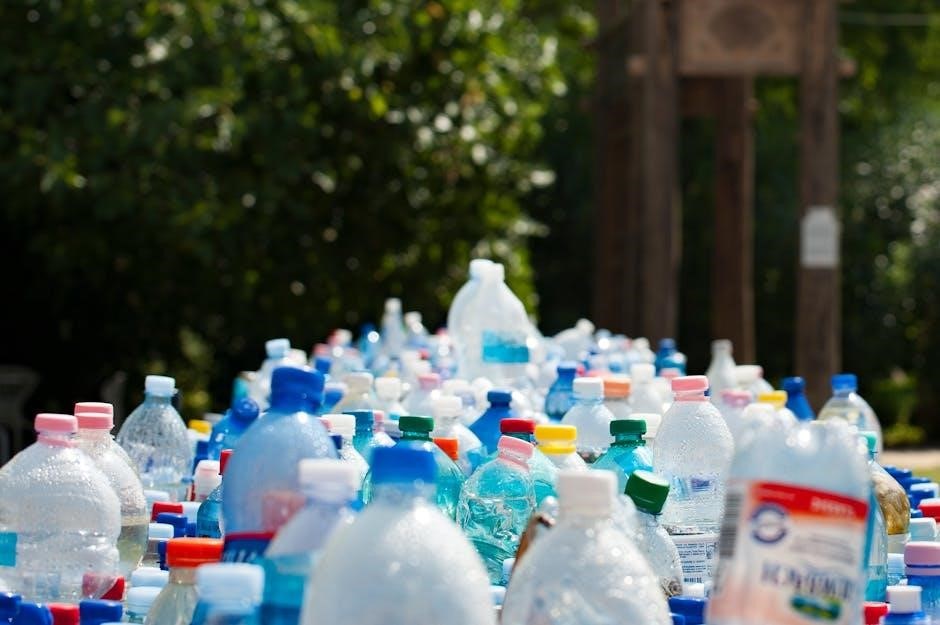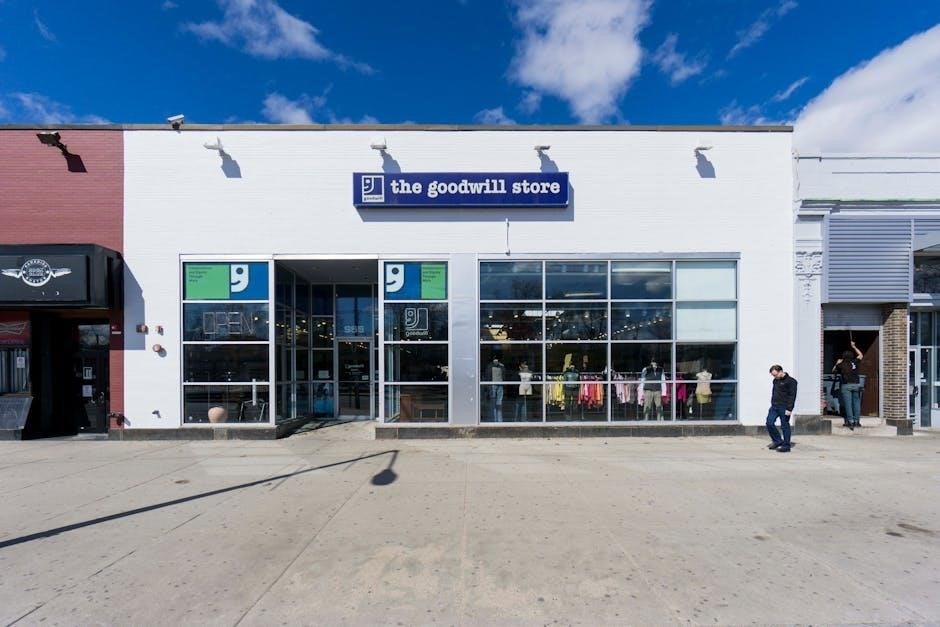
Boston offers comprehensive recycling initiatives, including curbside collection for metal, glass, plastic, and paper, with no sorting required, aligning with the city’s zero-waste goals and community engagement.
Overview of Curbside Recycling Services
Boston’s curbside recycling program provides residents with convenient collection services for metal, glass, plastic, and paper products. Residents can place all recyclables in a single bin without sorting, simplifying the process. The city offers weekly collections, with schedules varying by neighborhood. This service aims to enhance sustainability and reduce landfill waste. By participating, residents contribute to Boston’s zero-waste goals. The program is designed to be user-friendly, encouraging widespread participation and fostering a greener community. Visit the city’s website to confirm collection days and ensure compliance with guidelines for proper recycling practices.
Special Collections and Drop-off Points
Boston provides special collection services for bulk items, hazardous waste, and electronics, which cannot be disposed of through regular curbside pickup. Residents can schedule appointments for bulky items like furniture or appliances. Hazardous waste, such as batteries and chemicals, and electronics, including computers and televisions, must be taken to designated drop-off locations. These services ensure safe disposal and recycling, protecting the environment. Visit the city’s website to find drop-off points and schedule collections, helping Boston achieve its sustainability goals while maintaining a cleaner, greener community. Proper disposal of these items is crucial for environmental safety.

Understanding What Can and Cannot Be Recycled
Boston’s recycling programs accept paper, glass, metal, and plastic, but prohibit items like hazardous waste and non-recyclable materials. Proper separation ensures efficient processing and environmental benefits.
Accepted Materials: Paper, Plastic, Glass, and Metal
Boston’s recycling programs accept a variety of materials, including paper, plastic, glass, and metal. Paper products like newspapers, cardboard, and mixed paper are recyclable. Plastic bottles and containers, labeled #1 through #7, are also accepted. Glass bottles and jars of any color can be recycled. Metal items, such as aluminum and steel cans, foil, and scrap metal, are included. Residents are encouraged to rinse containers and remove lids or caps. Sorting is not required, as Boston uses single-stream recycling. Properly preparing these materials ensures efficient processing and supports the city’s sustainability goals.
Prohibited Items: Hazardous Waste and Non-Recyclable Materials
Boston’s recycling program prohibits hazardous waste and non-recyclable materials to ensure safety and efficiency. Items like batteries, electronics, chemicals, and medications are considered hazardous and must be disposed of through special collection events. Non-recyclable materials, such as plastic bags, Styrofoam, and shattered glass, are not accepted in curbside recycling. These items can contaminate the recycling stream or damage processing equipment. Residents are urged to check local guidelines for proper disposal methods, as improper disposal of hazardous waste can harm the environment and public health. Correctly managing these items supports Boston’s sustainability efforts and maintains the integrity of its recycling programs.
Preparation and Sorting Guidelines
Boston’s recycling program allows comingled collection of paper, plastic, glass, and metal. Keep items loose in bins; avoid contamination from non-recyclable materials for efficient processing.
Best Practices for Sorting Recyclables
To ensure efficient recycling, residents should sort materials correctly. Place paper, plastic, glass, and metal in the designated bin without sorting. Keep items loose, avoiding bags or tangling. Rinse food and liquid residue from containers. Remove lids, labels, and caps, as they may not be recyclable. Flatten cardboard and large paper products to save space. Avoid including non-recyclable items like Styrofoam or broken glass, as they contaminate the stream. Participate in special collections for hazardous waste and electronics. Proper sorting helps maintain the quality of recyclables and supports Boston’s sustainability goals. Stay informed through city resources for updates on accepted materials.
Avoiding Contamination in the Recycling Stream
Contamination in recycling occurs when non-recyclable items or improperly prepared materials are mixed with recyclables, reducing their value. Common culprits include food residue, liquids, and non-recyclable plastics. To prevent contamination, rinse containers, remove lids and labels, and avoid bagging recyclables. Keep hazardous waste, electronics, and bulky items separate. Boston residents should only include accepted materials like paper, glass, metal, and certain plastics. Contaminated loads may be rejected, harming the recycling process. Stay informed about acceptable items through city resources and online tools to ensure clean, high-quality recyclables. Proper practices help maintain efficient recycling operations.

Zero Waste Initiatives in Boston
Boston aims to reduce waste through innovative programs and community engagement, promoting sustainability and resource efficiency across the city.
City-Wide Goals for Reducing Waste
Boston has set ambitious targets to minimize waste, focusing on enhancing recycling rates and adopting sustainable practices. The city aims to achieve zero waste by implementing advanced recycling technologies and encouraging community participation through educational programs. By promoting efficient waste management, Boston strives to reduce landfill reliance and create a cleaner, greener environment for future generations. These initiatives reflect the city’s commitment to environmental sustainability and long-term ecological health.
Community-Driven Zero Waste Programs
Boston’s zero waste initiatives actively engage residents, fostering a collective effort to reduce, reuse, and recycle. Local organizations and neighborhoods lead workshops, hosting events that educate on sustainable practices and proper waste disposal. These grassroots programs encourage participation, creating a sense of shared responsibility and environmental stewardship. By involving the community, Boston aims to build a culture of sustainability, ensuring that all residents contribute to the city’s eco-friendly goals. These collaborative efforts highlight the importance of teamwork in achieving a greener, healthier Boston for all.

Recycling Collection Schedules and Zones
Boston provides residents with a tool to find their specific recycling collection schedules. The city is divided into zones to organize efficient waste collection services.
How to Find Your Collection Schedule
Residents can easily determine their recycling collection schedule through Boston’s official website or the city’s 311 app. By entering their address, homeowners can view specific dates for pickups. The tool provides detailed calendars, ensuring residents stay informed. Additionally, users can sign up for reminders to never miss a collection day. This system streamlines the process, making it convenient for everyone to participate in recycling programs efficiently.
Understanding Recycling Zones in Boston
Boston divides its neighborhoods into distinct recycling zones to manage collections efficiently. Each zone has designated days for pickups, ensuring services are well-organized. Residents can identify their zone using the city’s online tools, which map addresses to specific schedules. This zoned approach helps maintain consistency and reduces delays. By understanding your zone, you can better plan for collection days and contribute to the city’s waste management goals. This system is designed to enhance service reliability and encourage higher participation in recycling programs across all areas of Boston.

Education and Resources for Residents
Boston provides workshops, educational materials, and online tools to help residents understand recycling best practices. These resources include guides, videos, and expert-led sessions, ensuring everyone can participate effectively.
Workshops and Educational Materials
Boston offers a variety of educational resources to help residents improve their recycling habits. Workshops are conducted regularly, covering topics like proper sorting techniques and reducing waste. These sessions often feature expert speakers and interactive activities. Additionally, the city provides detailed guides, infographics, and videos to explain recycling best practices. Residents can access these materials online or through community centers. The goal is to empower everyone with the knowledge needed to contribute effectively to Boston’s sustainability efforts. These resources are designed to be accessible and user-friendly, ensuring all residents can participate.
Online Tools for Recycling Queries
Boston residents can utilize online tools to address recycling-related questions. The city’s website features a search engine that helps users determine how to recycle specific items. Additionally, interactive maps provide collection schedules and drop-off locations. A “What Can I Recycle?” tool is available, allowing residents to enter items and receive disposal instructions. These resources are regularly updated to reflect program changes. By leveraging these digital tools, residents can make informed decisions about waste management, ensuring materials are handled correctly and efficiently. This accessibility promotes higher recycling rates and supports the city’s sustainability goals.

Challenges and Common Mistakes in Recycling
Contamination and improper sorting are common issues in Boston’s recycling programs, often caused by incorrect disposal of hazardous waste or non-recyclable items, affecting program efficiency.
Addressing Contamination Issues
Contamination is a significant challenge in Boston’s recycling program, often caused by improper disposal of non-recyclable items like food waste or plastic bags. These contaminants can ruin entire batches of recyclables, increasing costs and reducing efficiency. To combat this, the city educates residents on proper sorting practices and implements strict guidelines for single-stream recycling. Boston Public Works emphasizes the importance of clean, dry materials and provides resources to help residents identify acceptable items. By improving awareness and adherence to these rules, the city aims to reduce contamination rates and enhance the effectiveness of its recycling efforts.
Correcting Misconceptions About Recycling
Many residents hold misconceptions about recycling, such as assuming all plastics are recyclable or believing small items like bottle caps can be included. In Boston, only plastics labeled #1 and #2 are accepted, while items like straws, styrofoam, and food-soiled materials must be disposed of as trash. Another common myth is that rinsing recyclables is unnecessary, but clean, dry materials are essential for proper processing. The city works to clarify these misunderstandings through educational campaigns, ensuring residents understand what can and cannot be recycled to improve program efficiency and effectiveness. Accurate knowledge helps reduce contamination and supports Boston’s sustainability goals.

The Future of Recycling in Boston
Boston is advancing its recycling programs with innovative technologies and community initiatives, aiming to enhance efficiency and sustainability while promoting environmental stewardship for future generations.
Innovative Technologies and Initiatives
Boston is investing in cutting-edge technologies to improve recycling efficiency. Advanced sorting systems and AI-powered waste management tools are being implemented to reduce contamination and optimize collection processes. Additionally, the city is piloting smart bins equipped with sensors to monitor waste levels, enabling more efficient collection routes. These innovations aim to streamline operations and increase recycling rates. Community engagement is also a focus, with educational programs and digital platforms encouraging residents to participate actively in sustainability efforts. Together, these initiatives are transforming Boston’s recycling landscape for a greener future.
Community Involvement in Sustainability
Boston encourages residents to play an active role in sustainability through various community-driven programs; Neighborhood recycling workshops and clean-up events foster awareness and participation. The city partners with local organizations to host educational seminars on reducing waste and promoting eco-friendly practices. Residents can also join volunteer groups focused on park cleanups and environmental conservation. By engaging the community, Boston aims to cultivate a shared responsibility for sustainability, ensuring that everyone contributes to the city’s environmental goals. This collective effort is crucial for achieving a greener and more sustainable future.